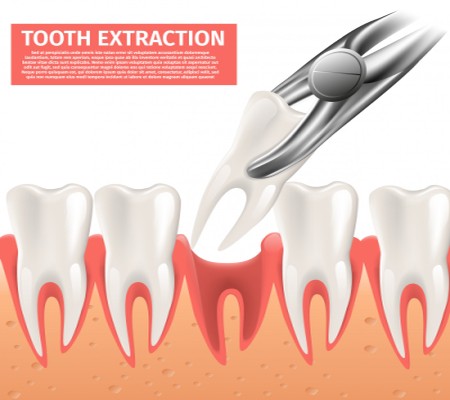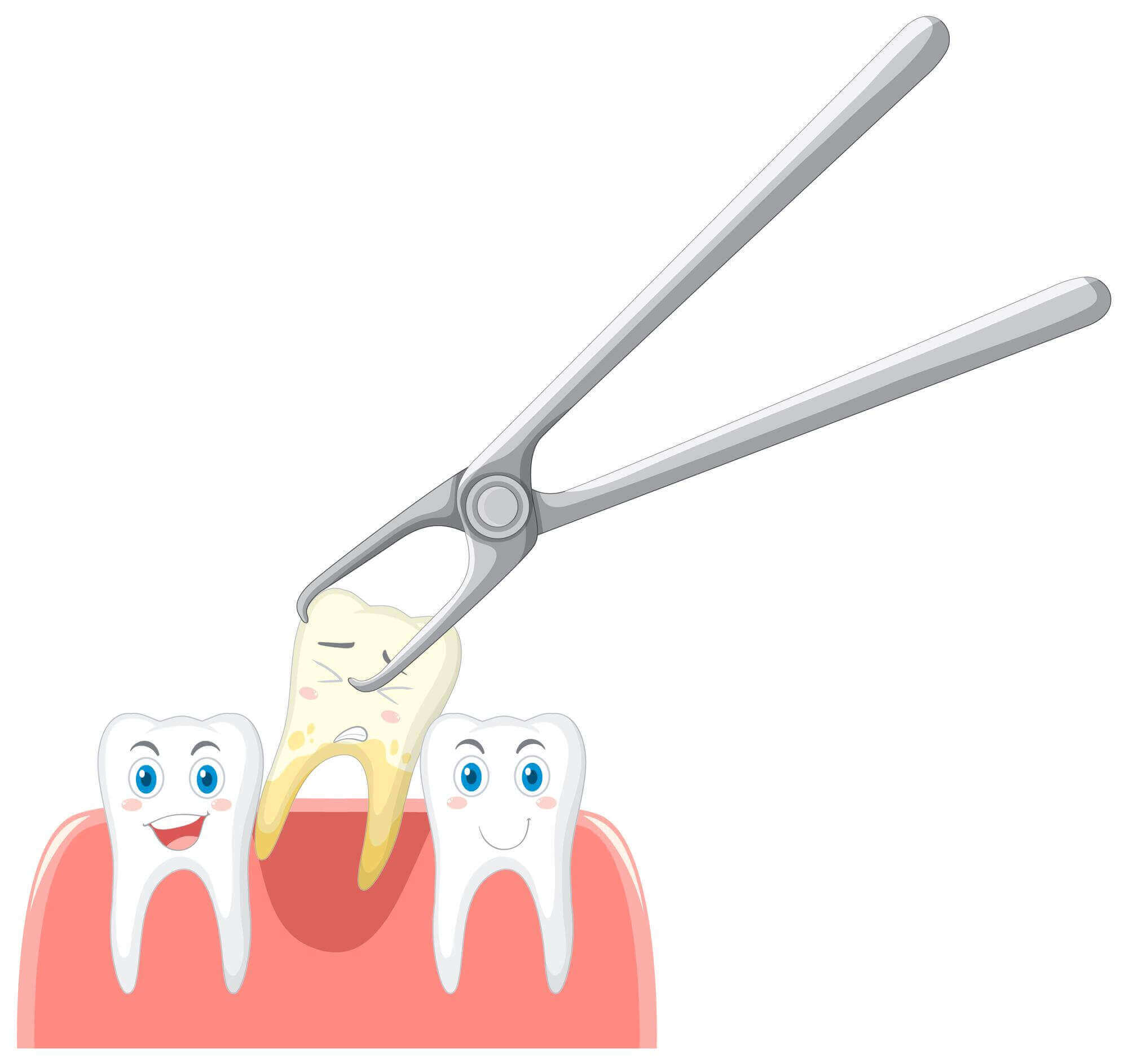Tooth Extraction turkey - impacted & wisdom tooth extraction in antalya turkey
What is tooth extraction?

Tooth extraction is the process of removing the teeth from their sockets in the bone as a last resort in cases where they cannot be treated.
Tooth extraction is successfully performed at Dent Plaza Group Dental Clinic, one of the best clinics in Antalya. Our patients who want to have a tooth extraction can contact our dental clinic in Antalya for an appointment.
In which cases is tooth extraction applied in Antalya Turkey?
Tooth extraction is performed in the following cases:
- Bruises or fractures of teeth; If the tooth is too advanced to save with filling, root canal treatment, or crown procedures,
- If the loss of surrounding tissues supporting the tooth is too high as a result of gingivitis,
- If unnecessary teeth prevent the emergence of other teeth
- If the milk teeth did not fall in time for the permanent teeth to erupt
- If it is necessary to make room for orthodontic treatment,
- If impacted or semi-impacted wisdom teeth cause cavities, pain, and abscess formation.
- Risk of infection in the tooth when the immune system is weakened due to chemotherapy, drugs used for organ transplantation, or any other medical complication
- Having problems such as tumors or cysts
How Is Tooth Extraction Performed?
- Before tooth extraction, local anesthesia is applied to the area where the tooth will be extracted.
- Gum and bone tissue are cut.
- By using forceps, the bonds of the tooth with the jawbone are loosened by moving the tooth back and forth.
- A gauze pad is placed in the tooth cavity to stop bleeding after tooth extraction.
- However, wisdom tooth extraction requires general anesthesia, conscious sedation, or intravenous anesthesia. More complicated tooth extractions, called surgical tooth extraction (extraction), are performed by specialist dentists or maxillofacial surgeons.
What Should Be Considered Before Tooth Extraction in Antalya Turkey?
Before tooth extraction, we must share the full medical history with the dentist. These are;
- Regularly used drugs and supplements,
- damaged or artificial heart valve,
- congenital heart defect,
- impaired immune system,
- liver disease (cirrhosis),
- artificial joints such as hip replacement,
- Conditions such as bacterial endocarditis must be reported to the dentist.
What should be considered after tooth extraction?

- After tooth extraction, pressure should be applied to the extraction site with a tampon for 30 minutes. The tampon stops the bleeding and allows the clot to form.
- Do not eat anything until the numbness in the mouth is gone. After tooth extraction, hot, cold, acidic, spicy, and extremely spicy foods should be avoided for a certain period of time. Soft foods should be fed for a few days after tooth extraction.
- Smoking and alcohol should not be used for three days after tooth extraction.
- When tooth extraction is complicated, the external cold procedure can be applied at 5-10 minute intervals for 8 hours after extraction.
- After tooth extraction, the extraction area should not be touched with the tongue or brush. Otherwise, the tooth extraction site may become infected.
- It is normal to have pain after tooth extraction. Medicines recommended by your doctor should be used regularly.
- For 24 hours after tooth extraction, it is necessary to avoid rinsing this area vigorously with water or spitting not to dislodge the clot formed in the socket.
- After 24 hours, the mouth can be washed by mixing half a teaspoon of salt with a glass of warm water.
- Pipette should not be used during the first 24 hours.
- The head should be supported with a pillow and kept up while lying down. Lying flat can prolong the bleeding process.
- In addition to brushing the teeth and tongue, flossing should be continued by staying away from the extracted area. Doing so will help prevent infection.
- If the bleeding or severe pain continues for more than four hours after tooth extraction, the dentist should be called again, and the situation should be reported.
- If symptoms of infection, including fever and chills, nausea or vomiting, redness, swelling or excessive discharge from the affected area, cough, shortness of breath, or chest pain are complained, it is necessary to consult a dentist again.
What is a wisdom tooth?
Wisdom teeth are four molars at the back of the two lower and two upper jaws. Wisdom teeth cause pain, abscess formation, and discomfort in most individuals. For this reason, wisdom teeth must be removed by tooth extraction or dental surgery. There is no such thing as removing wisdom teeth for every individual. For example, individuals with suitable jaw structures do not need wisdom teeth removed, while patients with unsuitable jaw structures and wisdom teeth embedded in the gingiva may need to have these teeth extracted. With a regular dental examination, the eruption and development of wisdom teeth can be followed, and in case of negativity, the teeth can be extracted without harming oral and dental health.
Should 20 teeth be pulled?
In cases where the wisdom tooth is healthy and does not harm oral health at the same time, and the tooth is completely positioned correctly, it does not need to be extracted.
Wisdom teeth can be extracted for the following reasons:
- Impacted: It is the case of 20 teeth covered with gingiva. Because of this, pain, swelling, and infection may occur.
- Misalignment: When 20 teeth come from the wrong angle, they can press on other teeth. This can cause crookedness or displacement of other teeth, resulting in mouth pain and bite problems. Treatment may even be needed to straighten other teeth.
- Caries: Since wisdom teeth are difficult to clean, decay and gingivitis are more common.
- Cyst Formation: Cysts that cause damage to the bones, teeth, and gums may occur due to impacted wisdom teeth.
- Sinking into the Cheek: The infection, which occurs due to ingrowing a 20 tooth into the cheek, progresses to the neck and cheek area through the lymph and spreads there.
- Need for Orthodontic Treatment: In orthodontic treatment (correction and treatment of the jaws) surgical procedures, impacted teeth should also be extracted.
When Should Wisdom Tooth Extraction Be Performed?
Wisdom tooth extraction; Since the roots of the teeth are not fully developed yet and the bones around the gums are softer, it will be easier to remove the wisdom teeth, so it is more appropriate to pull them out when they are young.
What Are the Signs of 20 Tooth?
- Pain in the tooth and gum
- Sensitivity in the gums
- Pain in the ear and jaw
- Swelling in the lymph nodes
- Bad odor in the mouth
- Pain felt during chewing
How are wisdom teeth extracted? How is wisdom teeth surgery done?
Non-surgical wisdom teeth extraction is the extraction process with local anesthesia of wisdom teeth that have come out at the right angle and need to be extracted due to problems such as congestion or caries. In this case, no surgical operation is required. Some impacted wisdom teeth have to be extracted with the help of surgical interventions called wisdom teeth surgery.
How is wisdom tooth surgery done?
- X-rays are taken to decide how the wisdom tooth surgery will be performed.
- In cases where the wisdom tooth is located in the gingiva, and the tooth roots are embedded in the jawbone, the wisdom tooth is divided into several parts by the dentist and extracted in this way.
- Or an incision is made in the gum of the wisdom tooth. The tooth can be easily extracted through this incision.
- After 20 tooth extraction and area cleaning, the gingiva is sutured.
- These sutures should be removed after a certain period of time after the operation.
Issues to be considered at home after wisdom tooth surgery;
- In order to ensure coagulation in the operation area, food should not be eaten, and water should not be drunk for the period recommended by the physician.
- Swelling may occur in the area after the operation, and severe pain may develop as the effect of anesthesia wears off. Painkillers prescribed by your doctor will prevent pain.
- The area where the tooth was extracted should not be touched by hand or tongue; the other side of the mouth should be used while eating.
- Smoking should also be avoided during the first 24 hours as it will increase bleeding.
- Ice compresses can be used to relieve swelling.
What to eat after tooth extraction?
You must consume only soft foods and fluids for a minimum of 24 hours after the dental removal. You can gradually return to a more regular routine once you feel well enough to eat. For several days, eat foods you can chew without difficulty. In the beginning, select chilled foods such as yoghurt, pudding, jelly and ice cream. If you decide to have ice cream, choose a type that does not include hard or tough pieces of sweets, and avoid ice cream sundaes. After the first day, try mashed potatoes, omlette, pancakes and broth-based soups without large chunks of meat. Eat these foods while they are still warm, not hot.
How long do tooth extractions take to heal?
If you have a standard extraction, you will probably feel better within a day or two. If you have a surgical extraction, it may take 48-72 hours to start getting well again. Your doctor can give you a prescribed painkiller or suggest an inexpensive pain reliever during this period. It can last 1-2 weeks for the extraction to close, and you might experience slight uneasiness and have to eat softer meals during this time, particularly if you have had a surgical procedure
Do they break your jaw to remove wisdom teeth?
No, the jaw does not usually have to be broken to extract wisdom teeth. Wisdom tooth extraction is routinely performed by oral surgeons or dentists as part of this surgical process. When treating patients for dental procedures, they will usually be given a local anesthetic (and sometimes a general anesthetic) before starting any work on them.
Once sedated, he or she will make an incision into the gum tissue to access the teeth that need to be extracted; sometimes this also involves removing some bone if necessary. How wisdom teeth need to be extracted depends on whether they are impacted and to what degree. We guarantee that your jaw will not be broken even during the most complex and labor-intensive extraction procedures.
But contrary to what you may think, it is not necessary to break your jaw to extract wisdom teeth that are fully embedded in the bone. Instead, it is enough to drill through the bone covering the tooth to complete the extraction (in this case, the total surface area is usually no more than half an inch to an inch).
Frequently Asked Questions (Tooth Extraction)
Tooth extraction prices vary according to the procedure, treatment, the number of teeth to be extracted, and the presence of impacted teeth.
To find out the most accurate and healthy tooth extraction price, you can go to the oral and dental health center and have your first examination free of charge.
The patient does not feel pain, cramps, ache, or pain due to the numbing of the area to be extracted with local anesthesia before tooth extraction. There is no need to worry about this.
Whether it is a wisdom tooth or a normal toothache, a toothache that does not sleep at night is the main problem for all people. Everyone is asked a lot about what is good for toothache. Although some procedures can be made at home, these are temporary solutions. A dentist should definitely examine you. Home remedies for toothache are:
- Gargle with warm and saltwater
- Ice procedure; If the cause of the toothache is swelling, ice is applied to the aching area.
- Clove oil; Clove oil is placed on a piece of cotton and kept around the gums and teeth until the pain subsides.
- Mixing baking soda with warm water is also good for gargling.
- If the pain continues, it is necessary to use medication for wisdom toothache.
Usually, between 17 and 20, they come out on the back of our chin, or they can't. Due to genetic factors, these teeth may erupt early or later. For example, it can come out at 16 or even at 70; even in a person who has lost all their teeth and uses a prosthesis, 20 teeth can come out.
